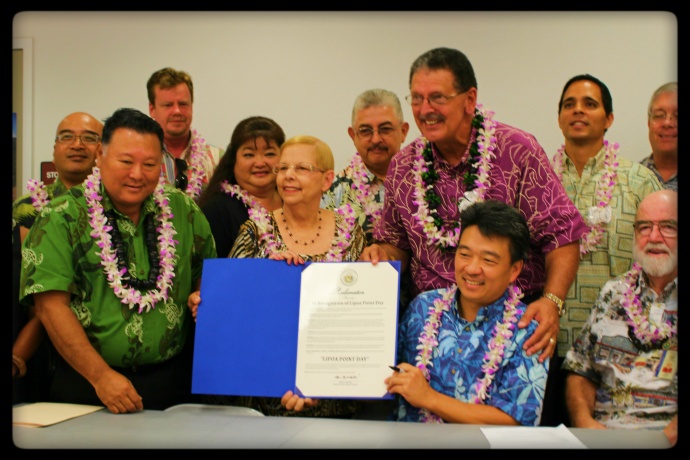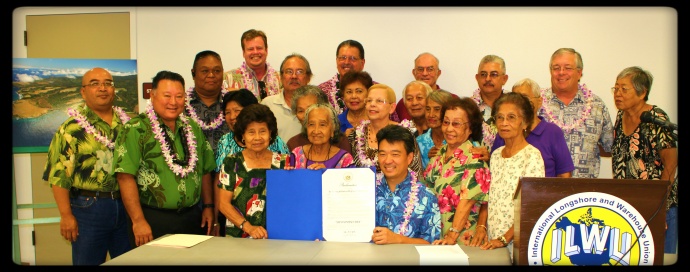[flashvideo file=http://www.youtube.com/watch?v=uSEZQz1ghGU /]

Acting Governor Shan Tsutsui signs proclamation for the preservation of Līpoa Point in perpetuity. Photo by Wendy Osher.
By Wendy Osher
Acting Governor Shan Tsutsui signed a proclamation today declaring Oct. 9, 2014, as Līpoa Point Day in the State of Hawaiʻi.
The Līpoa Point acquisition by the state effectively removes the threat of development, preserving the land in perpetuity for generations to come, and makes the way for the creation of a management plan.
During the ceremony held at the ILWU offices in Wailuku, Tsutsui joined state and local government officials as well as members of Maui Land and Pineapple Company in unveiling the state’s preservation plan.
“This today is such a special day, not only for our community today, but for future generations to come,” said Acting Governor Tsutsui. “These types of decisions are going to continue to make Maui really the best place in the world.”

Maui Land and Pineapple Company operations before the closure of the Kahului cannery. File photo by Wendy Osher.
Last year, Governor Neil Abercrombie signed Act 241 into law, directing the state Department of Land and Natural Resources to acquire Līpoa Point.
Tsutsui described Līpoa Point as, “one of the most iconic landmarks in Hawaiʻi,” with “irreplaceable Hawaiian cultural sites” and “breathtaking views of the rugged West Maui coastline.”
Located north of Kapalua in West Maui, the parcel is situated in the ahupuaʻa for Honolua, and is part of of the Honolua-Mokulēʻia wildlife conservation district.
According to Tsutsui, the site served as the launching point for the maiden voyage of the Hōkūleʻa in 1976. It is also the site of two heiau, boulders and grinding surfaces, house platforms, burial mounds, and archaeological terraces.
The area also serves as a popular site for recreational activities including snorkeling and surfing that continues to attract visitors, subsequently generating revenues for the state’s top visitor industry, said Tsutsui.
Under the law, a $20 million budget appropriation was included for acquisition. The state Department of Land and Natural Resources and the Hawaiian Islands Land Trust were tasked with working together to acquire the parcel and protect it from development. The measure also aimed to ensure that proceeds of the sale benefit the pension plan of Maui Land and Pineapple Company retirees.
Maui Land and Pineapple Company chairman and chief executive officer Warren Haruki shared a brief chronology of how the acquisition came about.
“Back about five to six years ago, MLP’s financial situation was quite challenging. We had experienced a recession and a downturn in the real estate market just as we had begun marketing the new Kapalua Bay Residences project,” said Haruki.
“In addition, Maui Pineapple Company had suffered years of significant losses due to the change in business direction from a cannery to fresh pack operations,” he said.
“As we contemplated our strategic options, bankruptcy was a real possibility if we didn’t make drastic and dramatic changes. One of the toughest decisions that our board made was to shut down Maui Pineapple Company. In doing so, we were well aware that continued losses would eventually lead to bankruptcy and the loss of continued pensions for our retirees and the hundreds of current employees,” said Haruki.

Acting Governor Shan Tsutsui signs proclamation for the preservation of Līpoa Point in perpetuity. Photo by Wendy Osher.
Haruki said that as part of that transition, the company leased its upcountry lands to the newly formed Hāliʻimaile Pineapple Company. In an effort to cut losses at the Kapalua Bay Residences, Haruki said efforts were made to change MLP’s business model.
“Those corporate moves slowly began to pay benefits, but the company’s pension plan remained severely underfunded,” said Haruki. He said the company had to pledge a substantial amount of its lands in April of 2012 to protect the pensions in the event of bankruptcy or similar event.
“It was during this time that Mayor Alan Arakawa and the members of the council began to explore creative ways to acquire and preserve Līpoa Point,” aid Haruki. Some of the alternatives that surfaced included park credits and allowing short-term rentals at Kapalua Mauka.
During the 2013 legislature, many groups came together to jointly pass House Bill 1424 which directed the Department of Land and Natural Resources to acquire Līpoa Point. This legislation included $20 million in general obligation bond financing in the budget.
“The legislation would not have passed if it were not for work of Speaker Joseph Souki, Representative Angus McKelvey, Senator Gil Keith-Agaran, and Representative Justin Woodson,” said Haruki.
Haruki said the company’s labor partners, the ILWU, were also key players in getting the bill passed. “Thank you on behalf of the 1,000 ILWU retirees who will now be able to enjoy their retirement knowing that their pensions are fully funded,” said Haruki.
Once the bill was signed into law, the company began work with the state DLNR on surveys, environmental studies, and coordination with various state agencies.
“After about 15 months of outstanding cooperation, which in state government time is very short, between the various private and public entities, we are all gathered here to celebrate this win-win situation. Because of your collective efforts, the state has acquired an iconic parcel of land that is rich with marine, cultural and recreational resources. MLP’s pension is now fully funded and our 1,600 retirees have the financial security that they richly deserve after dedicating their lives for so many years,” said Haruki.